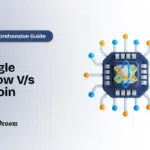Artificial intelligence (AI) and blockchain are two of the most transformative technologies of our time. These two fields while independently disruptive create an even more potent combination when fused. Artificial Intelligence in blockchain isn’t just a buzzword anymore. It’s actually seen to be making the way for new autonomous economies that operate without human intervention.
- AI and Crypto: A Symbiotic Relationship
- Why Bitcoin? AI’s Preferred Currency
- Real-World Applications of AI in Crypto
- Market Prediction and Analysis
- Fraud Detection and Security
- Automated Trading
- Personalizing User Experiences
- Smart Contracts Optimization
- The Challenges of AI in Crypto
- Future Possibilities: A Decentralized, AI-Driven Economy
- Road Ahead on Artificial Intelligence in Blockchain
The possibilities and use cases are endless you know from automated trading systems to AI-driven market prediction engines.
The power of decentralized and secure cryptocurrency combined with the analytical might of artificial intelligence. Combine these two, and you have game-changer innovations in your hands.
AI-powered tools could outshine traditional fraud detection systems. They can identify and thwart malicious activity. These intelligent systems could analyze market trends in real time while also executing trades at lightning speed to capitalize on favorable conditions.
And also not to forget that beyond trading AI can optimize smart contracts and mining operations. It’s like having a dedicated team of tech experts working tirelessly for you.
The future of cryptocurrency and AI is incredibly promising.
So, let’s dive into some real-world use cases and explore what the future holds for AI and crypto.
AI and Crypto: A Symbiotic Relationship
AI’s capacity for data analysis, prediction and automation complements blockchain’s decentralized, transparent and immutable nature. The interplay between these two technologies is already starting to fuel innovative applications.
So, what is the current state of AI in the cryptocurrency industry? Well, we’re already seeing it play out in some pretty interesting ways. Let me give you an actual example on this.
Recently, Brian Armstrong, CEO of Coinbase let us know about the first AI-to-AI crypto transaction. Here one AI bought tokens from another AI using crypto.
This one recent innovation was enough to tell us how a major milestone it is. It sets the stage for a future where autonomous machines trade, purchase services and conduct business with minimal human intervention.
As Armstrong puts it, “AI agents cannot get bank accounts but they can get crypto wallets.”
This is how AI and crypto become indispensable partners in a new digital economy.
The immutable and permissionless nature of crypto provides an ideal economic layer for AI agents to transact freely without needing to depend on legacy financial systems.
Why Bitcoin? AI’s Preferred Currency
Former BitMEX CEO Arthur Hayes had boldly predicted recently that Bitcoin will be AI’s native currency. Why? Well, simply put Bitcoin offers everything AI needs to stay operational! It’s permissionless, scarce and most importantly — it runs 24/7 without human interference.
Bitcoin’s decentralized and censorship-resistant architecture aligns perfectly with the needs of AI. It requires continuous access to data and computational power to function.
Hayes argues that traditional banking systems you know with their centralized controls and slow processing times simply can’t keep up with the operational demands of autonomous AI systems.
In a world where AI-driven systems need constant “food”—data and compute power—Bitcoin offers a seamless payment rail that is always available and never at risk of deplatforming.
Real-World Applications of AI in Crypto
AI is already proving its value in the crypto space across a variety of use cases. Here’s how AI is being applied today—
Market Prediction and Analysis
What if you had an innovation like AI that could actually tame the chaotic feeling of riding a wild bull?
AI algorithms as we know it are designed to digest vast quantities of historical market data, predict price movements and identify trading opportunities. AI models can deliver actionable insights. This can make the volatile world of crypto trading far more manageable and less emotionally driven. In essence, AI gives traders a powerful tool to steer through turbulent markets with precision.
Fraud Detection and Security
Cryptocurrency was designed for security and decentralization and yet there are always bad actors searching for vulnerabilities to exploit.
AI is a big asset in identifying fraudulent activities in the decentralized world of crypto. By analyzing transaction patterns and spotting anomalies, AI can preempt security threats. And so it strengthens the trust and reliability of blockchain networks.
Automated Trading
Trading crypto can feel like juggling flaming swords—constantly tracking markets, crunching data and making split-second decisions. It’s exhausting and honestly borderline maddening! But what if you could hand off all that chaos to an AI bot and let it do the heavy lifting?
These bots monitor the markets around the clock. They can make trades based on predefined strategies which can eliminate human error and ensure consistency.
Personalizing User Experiences
As might have noticed that in the cryptoverse there’s no such thing as a one-size-fits-all. Some are traders, others are long-haul investors and a few live for the thrill of DeFi degen gambling—you know the type. This is where AI steps in to fit each user’s distinct preferences and quirks!
AI enables crypto platforms to adapt to individual users’ behaviors, preferences and goals. Whether you’re a trader, DeFi enthusiast or casual investor AI customizes your experience. This way AI makes the often complex world of crypto feel more intuitive and accessible.
Smart Contracts Optimization
The self-executing nature of these contracts offers some inherent advantages when it comes to making the use of the power of artificial intelligence.
AI can help optimize smart contracts by analyzing their conditions and ensuring efficient execution. It can even integrate real-world data into smart contracts which make them more dynamic and responsive to external conditions.
The Challenges of AI in Crypto
While the fusion of AI and crypto holds immense potential, it’s not without its hurdles. One extremely major issue is data integrity. AI systems rely on high-quality data but in the decentralized world of crypto we have to ensure accuracy. This ultimately can be challenging. So of course, flawed data can lead to incorrect predictions, missed trades or even security vulnerabilities.
Now addressing the elephant in the room – regulations! The global community is beginning to address the growing influence of AI. The first international AI treaty signed by the US, Britain and the EU has been an attempt to guide AI development responsibly. The agreement that has been crafted by 57 countries seeks to balance innovation with protecting human rights and the rule of law.
We can safely presume at the point that as AI continues to integrate into the crypto space frameworks like this treaty and the EU’s AI Act will become increasingly important. We will need to set clear boundaries for the ethical use of AI.
Future Possibilities: A Decentralized, AI-Driven Economy
Alright now picture this–AI and crypto coming together for sectors like finance, logistics, healthcare and more. AI-powered Decentralized Autonomous Organizations (DAOs) could run independently. These DAOs can make decisions and execute contracts on their own. No human intervention needed.
AI-driven oracles will feed live data into smart contracts. That will definitely open the door to new decentralized applications (dApps) that span multiple industries.
Think about AI managing your crypto portfolio. It could make real-time adjustments, track market trends and optimize liquidity—all without your input. This isn’t some distant vision– no, we’re already witnessing the early stages of it now.
Over time, Artificial intelligence in blockchain can help in the ability to predict outcomes and blockchain’s transparency will extend far beyond finance. Picture applications in healthcare, supply chains or even disaster relief. Long story short? By analyzing vast data sets in real-time and using blockchain’s secure infrastructure, AI can streamline resources, improve decision-making and boost efficiency.
Road Ahead on Artificial Intelligence in Blockchain
The convergence of Artificial intelligence (AI) and crypto is not just a passing trend it’s a fundamental shift in how digital economies will operate. From AI making its own purchases in crypto to powering decentralized platforms and financial systems the intersection of these technologies is bringing new changes to the future.



















